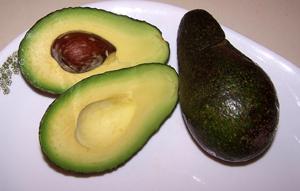Avocado

The avocado contains essential fat that you need to eat for your body to absorb fat soluble vitamins like Vitamin E and other nutrients. It is also very low in cholesterol and sodium. The avocado has 13 grams of fiber. It is also a great source of Vitamin K, C and Folate.
Avocados naturally contain these nutrients.
MONOUNSATURATED FATS (3g per serving) – Helps to lower blood cholesterol if used in place of saturated fats.
VITAMIN K (6.3 mcg/8% DV per serving) – Vitamin K is a fat-soluble vitamin that plays an important role in blood clotting.
FOLATE (27 mcg/6% DV per serving) – Promotes healthy cell and tissue development. Folate is also essential for metabolism of homocysteine and helps maintain normal levels of this amino acid.
POTASSIUM (152 mg/4% DV per serving) – In the body, potassium is classified as an electrolyte. Potassium is a very important mineral to the human body. It has various roles in metabolism and body functions and is essential for the proper function of all cells, tissues, and organs: It assists in the regulation of the acid-base balance; assists in protein synthesis from amino acids and in carbohydrate metabolism; and, it is necessary for the building of muscle and for normal body growth.
VITAMIN E (.590 mg/4% DV per serving) – A fat-soluble vitamin that acts as an antioxidant that protects the body tissue from damage caused by unstable substances called free radicals. Free radicals can harm cells, tissues, and organs. They are believed to play a role in certain conditions associated with aging. Vitamin E is important in the formation of red blood cells and helps the body use vitamin K. At lower levels, vitamin E may help protect the heart. Vitamin E also plays a role in healthy skin and hair.
LUTEIN (81 mcg) – A carotenoid (a natural pigment) that may be associated with a lower risk of eye diseases. Lutein is an important antioxidant that may help your eyes stay healthy while maintaining the health of your skin. It provides nutritional support to your eyes and skin and has been linked to promoting healthy eyes through reducing the risk of macular degeneration, the leading cause of blindness in adults 65 years of age and older.
MAGNESIUM (9.0 mg/2% DV per serving) –An essential mineral for human nutrition. Magnesium in the body serves several important functions: Contraction and relaxation of muscles; Function of certain enzymes in the body; Production and transport of energy; and Production of Protein.
VITAMIN C (2.6 mg/4% DV per serving) –A water-soluble vitamin that is necessary for normal growth and development. Vitamin C is one of many antioxidants. Antioxidants are nutrients that block some of the damage caused by free radicals, which are by-products that result when our bodies transform food into energy. Vitamin C is required for the growth and repair of tissues in all parts of your body. It is necessary to form collagen, an important protein used to make skin, scar tissue, tendons, ligaments, and blood vessels.
VITAMIN B6 (0.086 mg/4% DV per serving) –A water-soluble vitamin. Water-soluble vitamins dissolve in water. The body cannot store them. That means you need a continuous supply of such vitamins in your diet. Vitamin B6 helps the immune system produce antibodies. Antibodies are needed to fight many diseases. Vitamin B6 helps maintain normal nerve function and form red blood cells. The body uses it to help break down proteins. The more protein you eat, the more vitamin B6 you need.
Resources: Avocado.org, Nutritiondata.self.com, Avocadonutrition.net
Keith PayneFUNCTIONAL STRENGTH SYSTEMShttp://www.functionalstrengthsystems.com/
The World's Most Powerful Liquid Antioxidant!

